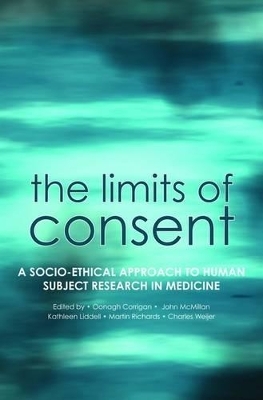
The Limits of Consent
Oxford University Press (Verlag)
978-0-19-923146-1 (ISBN)
Since its inception as an international requirement to protect patients and healthy volunteers taking part in medical research, informed consent has become the primary consideration in research ethics. Despite the ubiquity of consent, however, scholars have begun to question its adequacy for contemporary biomedical research.
The Limits of Consent explores this issue, reviewing the application of consent to genetic research, clinical trials, and research involving vulnerable populations. For example, in genetic research, information obtained from an autonomous research participant may have significant bearing on the interests of family members who have not consented to the study. This casts doubt on the adequacy of consent for such studies.
The Limits of Consent also questions the assumptions that informed consent is essential and that it satisfactorily protects the principle of individual autonomy. It reviews recent empirical studies that challenge the possibility of truly informed consent and highlights the extent to which consent is governed by social norms and expectations. It also investigates how consent might be of secondary importance in some circumstances, for example when a research project appears to protect a public or community interest.
Building on these observations, the authors make bold attempts to outline constructive solutions to the problems identified with perspectives from medicine, law, philosophy and sociology.
This fascinating and provocative exploration of the limits of informed consent will appeal to ethicists, social scientists, health lawyers, clinical researchers, research ethics committee members, policy makers, and others with an interest in bioethics.
Oonagh Corrigan's areas of research include informed consent, clinical trials, genetics and medical education. In 2007 she held a Leverhulme Trust visiting abroad fellowship at the University of British Columbia, and has previously held lectureship positions in Sociology at the Universities of Cambridge and Plymouth. She is editor of the journal Medical Studies. Dr Kathy Liddell is a Lecturer in Law at the University of Cambridge and a Fellow of Downing College. She teaches intellectual property, medical law and ethics, and torts, which complements her research on the regulatory frameworks that govern and provide incentives for medical research. She studied law and science at the University of Melbourne, bioethics at Monash University and completed her doctorate of law at the University of Oxford. She is Deputy Director of the Law Faculty's Centre for Intellectual Property and Information Law. John McMillan is responsible for designing and teaching the ethics curriculum at the Hull Yok Medical School. Prior to this appointment he held posts at the Universities of Cambridge, Oxford and Otago where he taught ethics to philosophy and medical students. He is a program director for the Institute of Applied Ethics at the University of Hull. Martin Richards is Leverhulme Emeritus Fellow at the University of Cambridge. Until his retirement in 2005 he was Director of the Centre for Family Research at Cambridge University, which he founded in 1968. His current research concerns genetic and reproductive technologies and family life. He is Vice Chair of the UK Biobank Ethics and Governance Council and a member of the Law and Ethics Committee of the Human Fertilisation and Embryology Authority. He was a member of the Human Genetics Commission (1998-2005) and has served on working parties of the Nuffield Council on Bioethics. Charles Weijer is a leading authority on research ethics. He is a philosopher and physician and holds the Canada Research Chair in Bioethics at the University of Western Ontario. His research, immediately recognizable for its relevance to important social issues and philosophical rigor, has broadly influenced scholarly discourse and the practice of clinical research. Especially influential is his work on the ethics of benefits and harms in research, research in developing countries, and research involving communities. He served as a consultant to the Joint United Nations Programme on HIV/AIDS, the US Institute of Medicine, President Clinton's National Bioethics Advisory Commission, the World Health Organization, and the World Medical Association. Dr Weijer was elected a Fellow of the Hastings Center (2002), Fellow of the Royal College of Physicians and Surgeons of Canada (2002), Fellow of the American College of Physicians (2007), and Fellow of the Canadian Academy of Health Sciences (2007).
Introduction ; 1. Informed consent in medical research - a procedure stretched beyond breaking point? ; 2. Beyond consent: the trust-based obligations of physicians to patients in clinical research ; 3. Consent and private liability in clinical research ; 4. The decision to refuse consent to participation in a clinical trial: does a double standard exist? ; 5. Beyond a rebarbative commitment to consent ; 6. The normative status of the requirement to gain an informed consent in clinical trials: comprehension, obligations and empirical evidence ; 7. Is there an obligation to participate in medical research? ; 8. Consent with older people: research as a virtuous relationship ; 9. Towards supported decision-making in biomedical research with cognitively vulnerable adults ; 10. Is consent sufficient? - a case study of qualitative research with men with intellectual disabilities ; 11. Consent to genetic testing: a family affair? ; 12. Cultural authority of informed consent: indigenous participation in biobanking and salmon genomics focus groups ; Conclusion
| Erscheint lt. Verlag | 29.1.2009 |
|---|---|
| Zusatzinfo | 1 black and white line illustration |
| Verlagsort | Oxford |
| Sprache | englisch |
| Maße | 163 x 240 mm |
| Gewicht | 513 g |
| Themenwelt | Geisteswissenschaften ► Philosophie |
| Medizin / Pharmazie ► Medizinische Fachgebiete ► Medizinethik | |
| Studium ► Querschnittsbereiche ► Geschichte / Ethik der Medizin | |
| Recht / Steuern ► EU / Internationales Recht | |
| ISBN-10 | 0-19-923146-X / 019923146X |
| ISBN-13 | 978-0-19-923146-1 / 9780199231461 |
| Zustand | Neuware |
| Haben Sie eine Frage zum Produkt? |
aus dem Bereich


